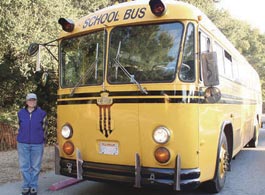home | metro santa cruz index | news | santa cruz | news article

Hitt By Bus: Pajaro driver says biodiesel is not just for Technicolor VW vans anymore.
Magic Bus
Pajaro Valley to introduce California's first biodiesel school bus program
By Leyna Krow
The Pajaro Valley Unified School District (PVUSD) is preparing to convert two of its school buses to run on fuel made from soybean oil in a pilot program recently approved by the school board. "I've always had an interest in alternative fuels, so this idea just seemed natural to me," says Pajaro Valley bus driver Kate Hitt, who championed the pilot program after getting her bus driver's license last March. Concerned for herself and her young passengers about the health risks associated with diesel fumes, Hitt began urging the PVUSD transportation department to consider switching to biodiesel. "It's a much cleaner-burning fuel," she says.
PVUSD, which serves North Monterey County, Pajaro Valley, Aptos and Watsonville, is the fifth-largest busing district in California. It maintains a fleet of over 100 buses and provides transportation for approximately 6,500 students. This pilot program marks the first attempt in the state of California to convert school buses to biodiesel. Several school districts in other states, including New Jersey, Illinois, Nevada and Virginia, have buses that run off of a blend of 20 percent biodiesel and 80 percent petrol diesel. The Pajaro Valley buses will use a blend that is 99 percent biodiesel and 1 percent regular diesel, which will be provided by a local biofuel company, Pacific Biofuel.
According to Pacific Biofuel CEO Mike Sack, the process of converting a school bus to run on biodiedel is surprisingly simple. "We just clean out the fuel tank and replace the old fuel lines with new, synthetic rubber ones, and that's about it," says Sack. "Any vehicle that can run off of petrol diesel can use biodiesel." In fact, the majority of Pacific Biofuel's customers are private commuters who choose to run their diesel vehicles on biodiesel. "Most of our customers are just conscious consumers. We deliver 55-gallon drums to their homes so these people never have to go a filling station."
PVUSD will monitor the fuel efficiency and emissions output of the two biofuel buses alongside two standard buses for three months. At the end of that time, if results are favorable, the transit department will take steps to begin converting more of the fleet to biodiesel as well.
According to PSUVD transportation director Jim Miller, this is not the first time the district has considered making the biofuel switch. "It's been on my radar screen for a while, but the cost was always a concern," says Miller. "But now there's government funding for biodiesel, and with the price of regular diesel on the rise, biodiesel has become a viable option for us."
The government funding Miller speaks of is more accurately a kind of rebate program. For every gallon of biofuel produced, the federal government offers a refund of 1 cent per percentage of biodiesel in the blend. For Pacific Biofuel, this works out to a 99 cent return per gallon, which they pass along to their customers, making the cost of a gallon to PVUSD around $3.40. "It's still a little more expensive, but they tell us that it's much better for the environment, so we're going to give it a try," Miller said.
Biodiesel, whether it's made from vegetable oil or recycled grease, is regarded as a much cleaner-burning fuel than petrol diesel or natural gas. This is beneficial not only from an environmental standpoint, but also for the health of those who ride in school buses. Exhaust that seeps into the bus during transit has been thought to contribute to incidences of childhood asthma, allergies and even lung cancer. "The biggest advantage to biodiesel is that the carcinogens that appear in regular diesel aren't present," maintains Sack, "so there aren't these horrible toxins that are poisoning the kids every time the bus starts up."
Those interested in learning more about biodiesel can contact Pacific Biofuel at 831.457.1328.
Send a letter to the editor about this story.
|
|
|
|
|
|